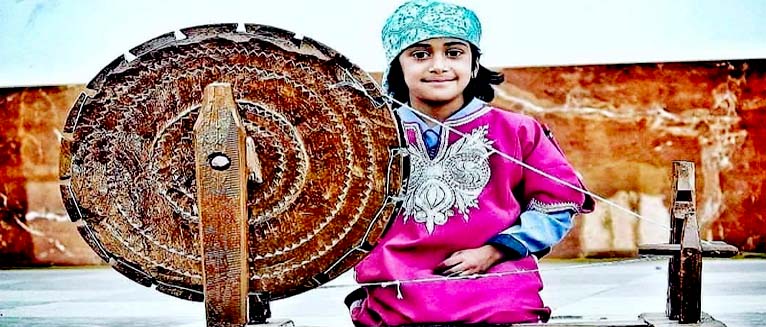Kashmir the Paradise on earth, of which the priests have Prophesized, the writers have eulogized, visitors written uncaptured travelogues, poets have sung & emperors have sighed “Only Kashmir”.
By Sayed Hasnain Qumi
Kashmir the Paradise on earth, of which the priests have Prophesized, the writers have eulogized, visitors written uncaptured travelogues, poets have sung & emperors have sighed “Only Kashmir”.
There are different traditions & culture in the whole worlds. Let us talk about a common tradition, where in a family a bride is given “keys” from her mother-in-law or some other elderly women of the family. In actual it’s the responsibilities handed over to her. But in Our Kashmir, it used to be little different. Along with keys spinning wheel famously known as Yindre or Inder (in Kashmiri) was also given to the younger ones by the grandmothers. There was a tradition of giving Yinder to daughters in dowery. But now a days these traditions are totally vanished in Kashmir. “Yindre” has its reference to Islamic period, Hazrat Fatima-tul-Zehra (Pbuh) used Yindre thus is considered holy by Muslims. 16th century mystics poetesses Habba Khatoon was a Yinder spinners too. It’s said Habba- Katoon has spent 50 years of her life in spinning Yinder to fulfill her family’s basic needs. The poetry of this poetesses reflects a lot about Yindre in one of the Vakh’s of Habba-Khatoon, she has quoted the lines below:
“Rangi Yindres Tcheker Phitmoo
Lakir Gasimoo Malinov hoo
Athi lakiraiy Chaan gasimoo
Jaan wandiyoo Malinov hoo”
Yinder as I said was considered holy and as a blessing by Kashmiris. It was considered of a great traditional & cultural importance. During the early years, all the Kashmiri women finished their household chores & engaged themselves in spinning while they used to sing Kashmiri folk songs, and the sound produced by Yinder used to add music to their songs. The Sound (“Krit Krit Krit….!”) of Yinder gave peace to ladies of that era, while is todays changing world same is considered as horrible noise. Traditions & culture changed to such an extent that Yinder which was a blessing for our ancestors is being considered as a curse by new generations.
There is a big question mark as why is it vanishing day by day?
Coming across the weavers, only handful of them are left reason being the less wages paid to them. The cost of one kilo of wool has increased from Rs. 6000/= to Rs. 13000/= in a decade but still some meager amount of wages is paid to artisans e.g. one rupee per knot thus a artisan can only earn 50-120rs from 10 grams of wool, which usually consumes minimum of 3-4 days. After the hard work of the poor weavers it is sent to a loom were another group of artisans weave the threads to manufacture a shawl, scarf, muffler etc. Afterwards these items are sold at very high costs but the people behind the scene who worked hard in creating a master piece have to struggle to meet their basic needs, which results in dissatisfaction among them. Though machines have come to the play now a days, utilizing less time and producing large outputs but handmade items are still leading the way because of its fine quality and durability.
Another reason could be that in today’s society women empowerment is only considered to be leaving for a 10-5 job and looking down to these artistic works because it is not going to help them to be financially independent. In my opinion modern day educated women could have put her efforts and creativity in this field too and taken it to new heights. But less financial gains have forced many the artisans to look for another avenue and Yinder has remained confined to Widows & families with no other source of income. Once were Yinder used to generate self-employment for Kashmiri women is lost in fake social status.
Yinder is in desperate need of attention from people and Government both. Government has an important role to play in fixing the maximum feasible wages of artisan to keep this cultural inheritance alive, otherwise it won’t be surprising to us when it will acquire a place of showpiece and we will be narrating its history only.



